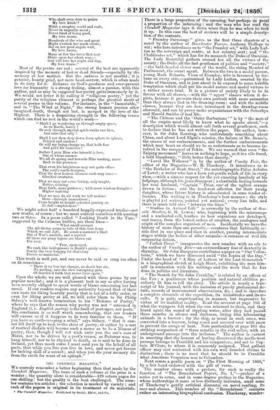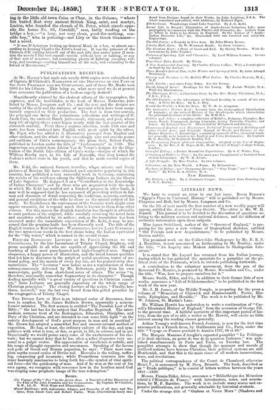THE COHNHILL MAGAZUCE. * WE scarcely remember a better beginning than
that made by the Cornhill Magazine. The issue of such a volume at the price is a wonder ;.- the quantity alone is considerable-128 octavo pages for one shilling: but the quality is the best challenged. The num- ber contains ten articles ; the selection is marked by variety ; and each of the papers is original in its treatment or its materials.
• The (bridal? Magethte. Published by Smith, Elder, and Co. There is a large proportion of -the amusing, bui'ierktips aiafti a proportion of the informing ; and the man who has read the Corsehill Magazine lays it down wiser than he was when he took it up. In this case the best of reviews will be a simple descrip- tion of the contents.
" Framley Parsonage " gives us the first three chapters of a
novel by the author of Barehester Towers, Anthony Trollope to
wit ; who here introduces us to " the Framley set," with Lady Luf- ton as the sovereign and centre, at her country seat ; and " the Chaldicotes set," which has for its monarch the Duke of Omnium.
The Lady Bountiful gathers around her all the virtues of the county ; the Duke all the fast gentlemen of politics and "society," —the bald-headed clever man of the world, the rising Member of
Parliament, the smart agent. Between the two is a model parson, young Mark Robarts, Vicar of Framley, who is favoured by for- tune on every side,—patronized by Lady Lufton, courted by the Duke of Omnium, and is just about to be exposed to some terrible temptation which shall put his model nature and model virtues to a rather severe trial. It is a picture of society likely to be in favour with all classes,—with the " upper" classes whom it de- picts, because it presents their own portrait with more animation than they always find in the drawing-room ; and with the middle classes, because they are here introduced to the drawing-room aforesaid, and can by proxy make acquaintance with the Sowerbys and Harold Smiths of real life.
" The Chinese and the Outer Barbarians " is by " the man of all the empire most likely to know what he speaks about,"—a description which would almost call forth several gentlemen, each to declare that he has not written the paper. The author, how-. ever, is Sir John Bowring, who understands something about China, and about Lord Elgin's mission, the failure of Mr. Bruce's, the causes of our embarassments, and the further embarrasments which may beset us should we be so unfortunate as to become in- volved in the conquest of Pekin. lire are warned that even "the Taiping movement" leaves us nothing to hope, as it is a vile fraud, a bold blasphemy, " little better than dacoity." "Lovel the Widower" is by the author of Vanity Fair, the editor of the Magazine—W. M. Thackery. It introduces us to "the Bachelor of Beak Street," the autobiographic Fidus Aehates of Lovel; a writer who has a keen yet gentle relish of life in every view,—with a sincere respect for the yet exacting landlady of his lodgings, although his jams disappear ; a charitable feeling towards her roué husband, " Captain " Prior, one' of the ugliest scamps drawn in fiction ; and the tenderest affection for their young daughter, whose future history is adumbrated in some tender al- lusions. The writing is in Thackeray's best manner ; the style is playful yet serious, pointed yet natural; every line tells, and there is much told also " between the lines."
"Studies in Animal Life" is avowedly by the author of Sea- side Studies, G. H. Lewes ; who, beginning with the microscope and a nucleated cell, teaches us how organisms are developed, and traces, from the lowest orders of creation, the analogues and origin of the complex organism of men. Incidentally we have the history of more than one parasite,—creatures that habitually re- side first in one place and then in another, passing intermediate stages within the bodies of other animals—a romance of real life surpassing fiction. "Father Front" inaugurates the new number with an ode to the author of Vanity Fair—an extraordinary feat of dexterity in rhyming. Sir John Burgoyne contributes a paper on " Our Volun- teers," which we have discussed amid "the Topics of the Day." Under the head of " A Man of Letters of the Last Generation " is a biographical sketch of Leigh Hunt, exhibiting the man him- self in connexion with his writings and the work that he has done in politics and literature.
"The Search for Sir John Franklin," is related by an officer of the Fox ; a gentleman whose position and natural abilities pe- culiarly fit him to tell the story. The article is nearly a tran- script of his journal, with the omission of purely professional de- tails, records of instrumental observations, &c. ; and is therefore a complete chronicle of the expedition, its vicissitudes and its re- sults. It is quite unpretendine‘° in manner, but impressive by virtue of its manifest reality. Read the account at page. 105 of what the voyagers felt when the sun returned to them, and they heard again the sound of rippling water, after they Lad passed three months in silence and darkness, living like hibernating animals in a burrow ; for the ship, as usual in such cases, was converted into a burrow, being eased and covered over with snow to prevent the escape of heat. Note particularly at page 105 the striking comparison of "three months in the coal cellar, with an underground passage into the icehouse." The author is earnest in asserting that the honour of having discovered the north-west passage belongs to Franklin and his companions, and not to Cap- tain M'Clure, to whom it is commonly assigned. That gallant officer may rest contented with his own well founded claims to distinction ; there is no need that he should. be to Franklin what Americus Vesputius was to Columbus.
Next comes a gentle poem on " The First Morning of 1860," by a fair hand endowed with the gift of verse. The number closes with a preface, for such is really the function of "The Roundabout Papers, No. 1,"—prefaco of a series yet to come, and in some degree preface to the Magazine, whose authorships it more or less distinctly indicates, amid some of Thackeray's gently satirical discourse on novel reading, its uses and abuses. This number of the " Roundabout " contains rather an interesting biographical confession. Thackeray, wander-
the littile old town Coke or Chur, in the Grisons, "where Ilea Ittriedlhat very ancient British King, saint, and martyr, Thicius, who, founded the church of St. Peter, which stands oppo- the house No. 65, Cornhill," sees, lazily reading on the bridge a boy,—" a lazy, not very clean, good-for-nothing, sen- sible boy," who is perusing—not Livy or the Greek Grammar— but a novel.
" It was D'Artagnan locking up General Monk in a box, or almost suc- ceeding in keeping Charles the First's head on. It was the prisoner of the Château d'If cutting himself out of the sack fifty feet under water (I men- tion the novels T like best myself—novels without love or talking, or any of that sort of nonsense, but containing plenty of fighting, escaping, rob- bery, and rescuing)—cutting himself out of the sack, and swimming to the Island of Montecristo."































 Previous page
Previous page